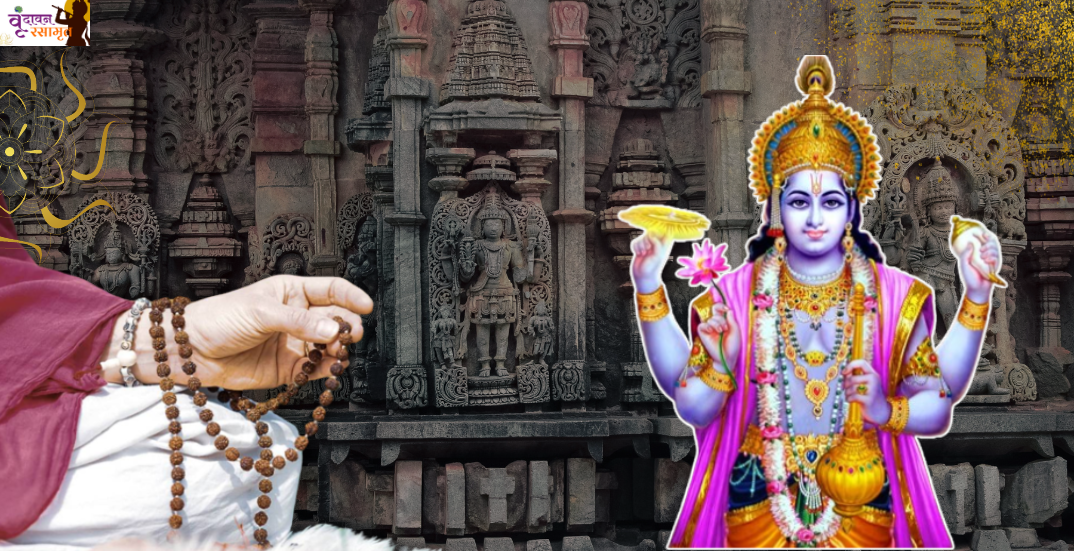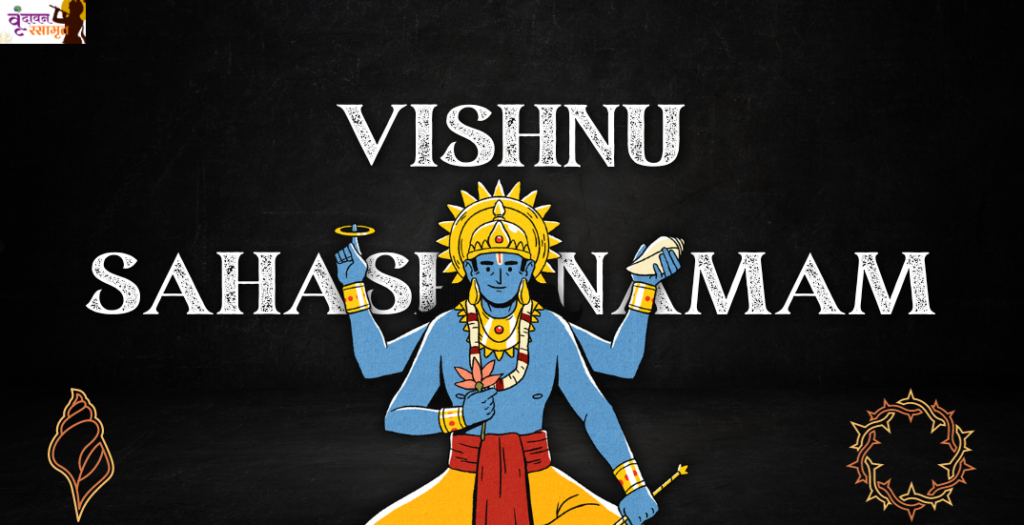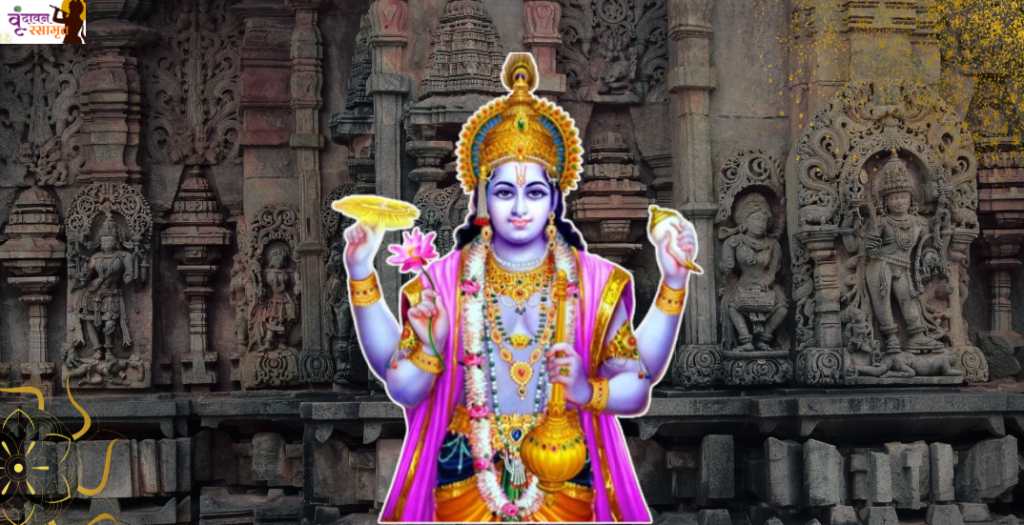In today’s blog we will know how much importance Vishnu Sahasranamam has in the history of our India. How did the 1000 names of God influence people’s lifestyle? And we will know how in today’s present time of social media, we can bring our life on the right path by taking the help of these 1000 divine names of God.
We are creating a series of articles on the topic of Vishnu Sahasranama, of which this is the fourth article. Read the previous article by clicking on the link given below:
Link: https://vrindavanrasamrit.in/vishnu-sahasranamam/the-mythology-behind-it-and-stories/
Imagine a treasure in the vast ocean of Hindu spirituality – that’s the Vishnu Sahasranamam. It’s not just a collection of words, but a profound spiritual text that holds a special place in the hearts of many. Now, think of an epic story, the Mahabharata, which is like a grand, ancient tree. Within this story, like a hidden jewel in its branches, is where the Vishnu Sahasranamam is found.
This text is like a garland of a thousand names of Lord Vishnu, each name like a fragrant flower, offering us a glimpse into his many divine qualities. But it’s more than just names; it’s a key to understanding deeper spiritual truths.
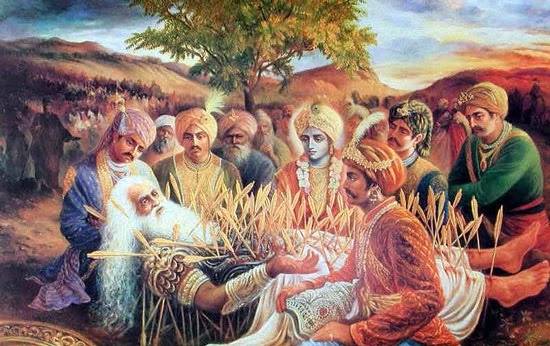
So, what are we going to do together? We’re going to take a journey back in time, to where it all began. We’ll explore not just what these names are, but also the rich history and the deeper meanings behind them. It’s like unearthing hidden treasures from an ancient world, and discovering how they can still shine a light in our lives today.
In simple words, we’re about to embark on a journey to understand this sacred text not just with our minds, but with our hearts. Ready to dive in? Let’s begin. 🌟
Tracing the Historical Roots
The Vishnu Sahasranamam, which means “A Thousand Names of Vishnu,” was first found in the Mahabharata, an epic that’s not just a story, but a vast ocean of spiritual wisdom. On the battlefield of Kurukshetra, after the great war, the wise Bhishma, lying on a bed of arrows, shares these thousand names of Lord Vishnu with Yudhishthira, the eldest of the Pandavas. It’s a moment of profound peace and spirituality amidst the remnants of war.
Spreading Through the Ages
Over centuries, this sacred text wove its way into the hearts and rituals of Hindus. Initially, it might have been known and recited by scholars and priests, but gradually, it spread to the common people. Think of it as a river of divine names, flowing from the scholarly heights of ancient India to the everyday lives of people, enriching their spiritual practices.
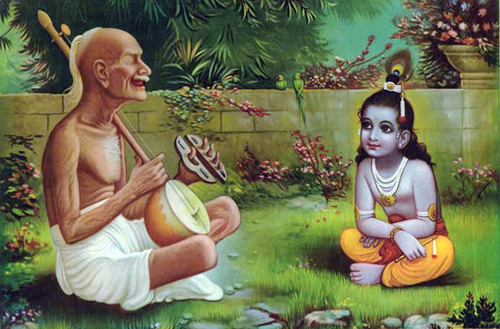
Ancient Understanding vs. Contemporary Interpretations
In ancient times, the Vishnu Sahasranamam was more than a prayer; it was a deep meditation, a way to connect with the divine. Each name of Vishnu held a universe of meaning, encompassing aspects of the universe, morality, and the human spirit. People believed that these names could bring blessings, protection, and a path towards enlightenment.
Now, move forward to our time. Today, while many still hold these beliefs, the Vishnu Sahasranamam has also taken on new dimensions. It’s not just about religious practice; it’s about finding peace, dealing with life’s stresses, and seeking personal growth. It’s chanted in homes, temples, and even online, connecting people across the globe.
So, there we have it – the Vishnu Sahasranamam, a timeless spiritual treasure, evolving yet eternal, as relevant today as it was thousands of years ago. It’s like a bridge connecting the ancient to the modern, the earthly to the divine.
The Societal Impact of Vishnu Sahasranamam
This sacred text, listing a thousand names of Lord Vishnu, served not just as a religious chant, but also as a moral compass. It instilled values of righteousness (Dharma), compassion, and the importance of duty (Karma). People found guidance in these teachings, shaping their daily actions and decisions.
Shaping Collective Consciousness
The Vishnu Sahasranamam has been a unifying force among Hindu communities. It brought people together, creating a shared spiritual experience. When communities gather to chant these names, there’s a collective energy that’s generated, reinforcing communal bonds and a sense of belonging.
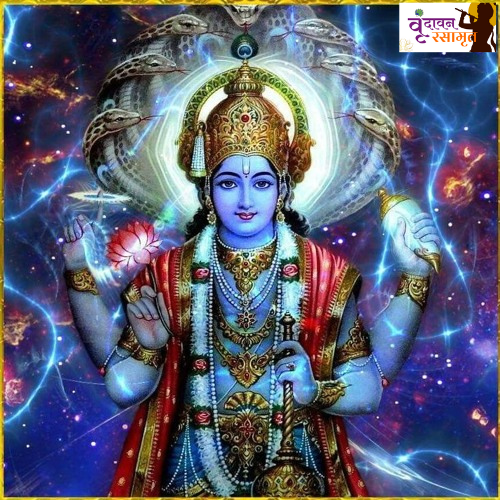
This practice helped in nurturing a common spiritual and cultural identity, fostering harmony and mutual respect among different groups within the Hindu fold.
Influence on Religious Rituals and Ceremonies
Over time, the Vishnu Sahasranamam became integral to various Hindu rituals and ceremonies. From daily worship in homes to elaborate temple ceremonies, these verses are chanted to invoke the blessings of Lord Vishnu. The belief is that reciting these names can bring peace, prosperity, and spiritual well-being.
This practice has been passed down through generations, becoming a cherished tradition that connects people to their ancestral roots and spiritual heritage.
It transcends mere recitation and enters the realm of personal and collective spiritual experience, binding communities with a thread of shared faith and values.
Linkages to Other Religious Texts and Practices
Vedas: These are the oldest texts in Hinduism, full of spiritual knowledge and hymns. The Vishnu Sahasranamam, though a later text, shares the Vedas’ deep devotion and respect for the divine. Just as the Vedas have hymns praising various deities, the Vishnu Sahasranamam is dedicated to praising Lord Vishnu, a major deity in Hinduism.
Puranas: These texts are like a vast ocean of stories and teachings about gods, goddesses, and sages. The Vishnu Sahasranamam, found in the Mahabharata (which is like a Purana), shares this storytelling aspect. It tells us about the greatness of Lord Vishnu through His many names, each representing a different quality or story.
Meditation and Chanting: Just like meditation helps in calming the mind and chanting mantras brings focus, reciting the Vishnu Sahasranamam has a similar effect. It’s like a spiritual exercise for the mind and soul, helping you feel peaceful and connected to the divine.

Yoga and Philosophy: In yoga, we try to balance our body and mind. Similarly, the Vishnu Sahasranamam balances our spiritual understanding. It’s not just about physical postures; it’s also about understanding deeper spiritual truths, just like in yoga philosophy.
Daily Life and Ethics: Hinduism teaches us to live a life of dharma (righteousness). The Vishnu Sahasranamam, by praising the qualities of Lord Vishnu, indirectly teaches us these values. For example, a name in the Sahasranamam might reflect kindness or bravery, inspiring us to adopt these qualities in our daily lives.
Festivals and Rituals: During various Hindu festivals, we celebrate different aspects of God. Reciting the Vishnu Sahasranamam during these times adds to the spiritual richness of the celebrations, much like singing bhajans or performing pujas.
Community and Sharing: Just as sharing knowledge and stories is a big part of Hindu culture, sharing the recitation of the Vishnu Sahasranamam in groups can be a way of coming together, much like how people gather for kirtans or satsangs.
Modern-Day Relevance and Adaptations
In our digital age, the Vishnu Sahasranamam has embraced modern forms, making it more accessible than ever. Digital renditions of the text and its recitations are available online, allowing people from all corners of the world to connect with this ancient wisdom. These digital platforms are especially appealing to the younger generation, bridging the gap between traditional spirituality and modern technology.
Furthermore, the Vishnu Sahasranamam has found its way into various forms of modern media. It’s not uncommon to hear its verses in movies, music albums, and even in educational settings. This integration into popular culture helps keep the text alive and relevant, introducing it to new audiences who might not have encountered it otherwise.

Educationally, the Vishnu Sahasranamam is being studied not just for its religious significance but also for its philosophical depth and cultural value. It’s becoming part of a broader conversation about spirituality and ethics in the modern world.
Conclusion
As we reach the end of today’s enlightening journey through the historical and spiritual landscape of the Vishnu Sahasranamam, I extend a heartfelt thank you to each one of you for joining us in this exploration. Your willingness to delve deep into the layers of this ancient wisdom, especially considering the 5 names that bring peace and prosperity, is a testament to your quest for spiritual knowledge and understanding.
In this blog, we traversed through time, understanding the profound impact of the Vishnu Sahasranamam on our culture and daily lives. From the battlefields of Kurukshetra to the modern digital world, we witnessed how these sacred names have continued to guide, inspire, and provide solace to countless souls.
For those who are eager to continue this journey of discovery, I invite you to read more on our website, Vrindavanrasamrit.in. Here, you will find a wealth of knowledge and insights that will further enrich your spiritual journey. Each article, each story, and each teaching on our site is a step towards greater understanding and connection with the divine.
Thank you once again for your time and engagement. May your path be blessed with the light of knowledge and the joy of spiritual growth. Namaste. 🙏🌟

